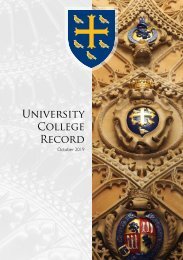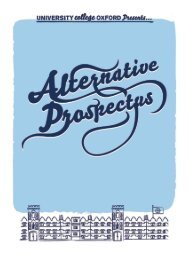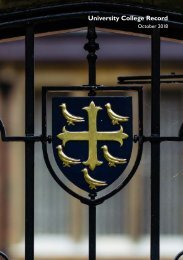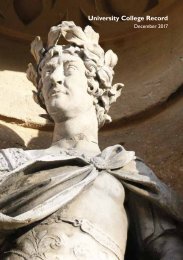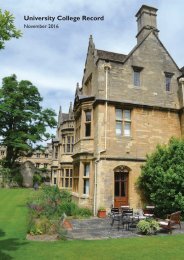University College Oxford Record 2020
You also want an ePaper? Increase the reach of your titles
YUMPU automatically turns print PDFs into web optimized ePapers that Google loves.
I the latter. Not all in both groups mixed easily
but George had no problem in fitting in with
the older crowd. We were both reading Modern
History and soon became friends.”
David Miers: “George’s many friends without
connection to the Benedictine world found it
disconcerting that as a monk he was known as
Leo but to everyone else he was still George. He
didn’t seem to mind which name people used.
This duality was appropriate, though, because
George led a life which took him well beyond
the confines of monastic routine and allowed
him to deploy his considerable talents widely
in education and the support of good causes.
He carefully nurtured his oldest friendships, and
throughout his life he remained always open to
new ones.”
David Edward: “A Puseyite
emerged from a visit to Cardinal
Wiseman regretting that there was
a lobster salad side to the Cardinal.
There was a joyous lobster salad side
to George, and many are the Lucullan
feasts we have enjoyed together. I
have a somewhat dim recollection
of an evening at home when he and I
consumed a bottle of vintage claret and then
a bottle of vintage port as the embers of the
fire turned to ash. One year he came with us on
holiday to the Isle of Lewis, and his lobster bisque
became a family legend. His devotion to his faith
was not the less for his pleasure in life and the
love of friends.”
David Miers: “Sadly, some in his Community
failed to realize the importance of adapting to
changing public attitudes, and resented the
necessary reforms in attitude and structure on
which George insisted, both at Ampleforth and
later at St Benet’s. Of course, the march of events
has vindicated his foresight.”
David Edward: “George ensured that St
Benet’s remained a Private Hall of the University,
which was not certain when he arrived, and
greatly invigorated the life of the students. When
he was recalled to a parish, they laid on a dinner
in his honour prepared by themselves.”
Alun Evans: “I had a number of friends whose
sons were at Ampleforth when George was
Headmaster. They all spoke in glowing terms of
the way he gave moral leadership and how he had
re-established much-needed firm discipline whilst
showing a real understanding of the pastoral side
of his role. Our last meeting, at Easingwold, was
marked appropriately by an excellent lunch at a
nearby restaurant run by a former Amplefordian.
He is greatly missed by his numerous friends.”
PROFESSOR JOHN ROARK
LINDSAY-SMITH
(Sherborne) died on 3 August 2019
aged 80 following heart surgery. His
widow Vanessa has kindly provided
this obituary:
John came up to Univ as a Chemistry
Scholar, obtaining a First in 1962. He
quickly became interested in the
burgeoning field of mechanistic organic
chemistry, one of whose pioneers was at Oxford,
Dick Norman (later Sir Richard Norman, FRS,
Rector of Exeter College), spending his Part II
year in Dick’s laboratory and staying on in the lab
to complete a DPhil in 1964.
John was then awarded a two year fellowship
to work with Nobel Laureate Melvin Calvin. His
work in the first year was blossoming when the
University of York, which had recruited Dick
Norman as its founding Professor of Chemistry,
advertised a Lectureship in Organic Chemistry.
76 University College Record | October 2020




